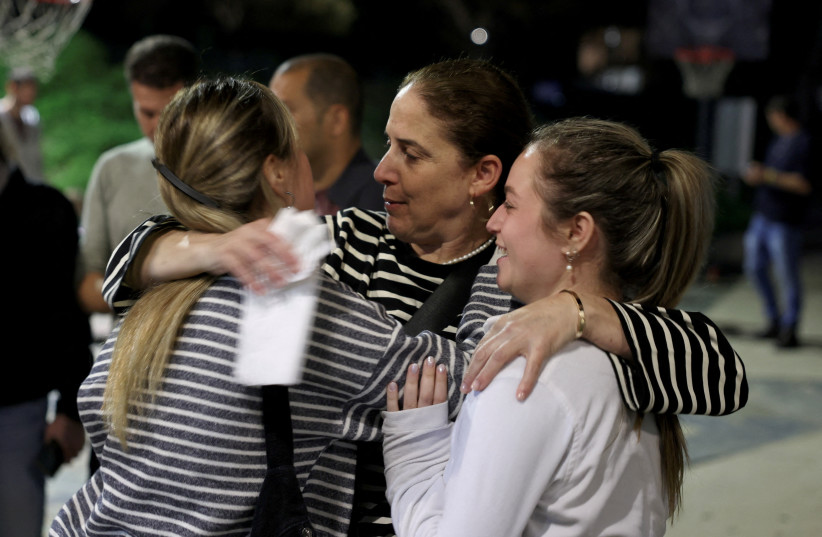Agam Almog-Goldstein, who returned from Hamas captivity in the prisoner exchange on November 26, spoke on Thursday with Army Radio about her time imprisoned in the Gaza Strip since being kidnapped during the Hamas attacks of October 7.
"I remember our entry into the city. I simply told my mom - they are going to torture me, they are going to rape me," Agam said.
Agam talked about the conversations with her mother in captivity, mentioning that they would look at each other and say that no one would understand them. "There are feelings that the body feels that cannot be explained. It is an absolute shock, no matter what I say, it won't be understood. We both looked at each other and understood that there would probably never be words. There will always be only feelings.
Agam was kidnapped on October 7 along with her mother, Chen Almog-Goldstein, 48, and two brothers, Gal, 11, and Tal, 9.
"Words are too small compared to what the body feels. So that's how it was. We looked and understood, as cliché as it may sound. We just had to look at each other and feel that we are in the same boat, feeling the same thing, and we couldn't talk about it because there are no words to describe it."
"Until now, I don't understand that I was there," she added. "It feels like someone else's story, someone who didn't really have a moment to understand this situation. I don't know if we will ever understand. But I remember telling my mom that they were going to do something to me, and that was the moment I realized that they were really taking me out of the house."
When asked when she was most afraid during captivity, Agam replied that the scariest time was during the nights. "With all the difficulty in saying it, I was most afraid of the [Israeli] airstrikes every night. At first, there was the fear of [the terrorists], which was the biggest fear. War and bombing take time to arrive until the country makes such decisions. Slowly, there were scarier fears, which were the heavy bombings."
Agam mentioned that she dreamt about her father and sister, alive, talking, and laughing in captivity. She, her mother, and two brothers were not separated in captivity, and although they occasionally met other kidnapped individuals, most of the time, they were alone. She also said that she wrote things in captivity, but they were left behind.
Chen's husband, Nadav, and their eldest daughter, Yam, were killed on the same day while in the safe room of their home. Yam remained with her father as he was recovering from surgery and couldn't move easily. The family lost contact with Yam at noon, and her body was later found. Almag recalled hearing confirmation of her father's death.

'What, won't I reach my 18th birthday?'
When asked when she worried the most about her brothers, Agam replied, "I worried about what they would do to them if my mother and I were harmed by the airstrikes. Those were the moments I was most worried about them. I kept saying to myself all the time - what, won't I reach my 18th birthday? At least give me until 18. And Gal and Tal, I thought, they're so young, what a shame. 'Shame' is a small word compared to this feeling, but as if, it really is a shame, it's a pity they won't experience things they need to experience."
Regarding the possibility that captivity changed her, she stated, "It changed many things for the worse and took away a sense of security from me, instilling a lot of fear, anxiety, confusion, and helplessness in me." When asked about the moment she would erase from her existence there, she mentioned that every time they moved them: "The transitions between people there, from place to place, because every transition I wondered if they were going to kill us. I think I would like to erase that from me altogether so that I wouldn't have this question in my life, if they are going to kill me. My life values have changed. Theirs was always different from ours - but mine changed after something like this."
"I don't believe there are still people there," she added, referring to the remaining 129 hostages. "It's hard for me to understand how people here go through the same process, drink the same cup of coffee, and live the same life after something that changes the order of the world. I'm glad there are those who continue with their lives; it shows a certain strength, but on the other hand - 71 days in captivity are like one long day. It's really the same day. So we are always moving forward but thinking about those who are still stuck there behind and want to say that they are in danger."
